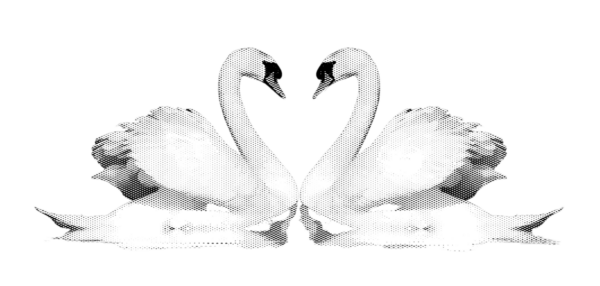
Mothers-of-Pearl Will Rush to the Aid of Non-Confluence
They led the swan into a forest and placed
beautiful white stones of mother-of-pearl on
her back. Go now and eat that which you have
taken from the swans.
—Ann Jäderlund, Soon Into the Summer I Will Walk Out (trans. Johannes Göransson)
1
Before the swans, there was
a carriage house. Even the feral mother
dashing into and out from the splintered
under-porch dodged my interest.
A spruce had thrust its thickest limb
through a corner window, too remote
to be whittled into a walking stick, too bumped
to ever be anguineous.
2
Algal blooms sustained the swans,
and a lilac kickball loitered on
the lake’s edge. Anything visible
is of the time, ordinary, and
astir. The swan’s neck’s return
from underwater grazing
split the surface soundlessly
as a breeze shifted course and
ruffled her cygnet’s rectrices.
3
The elect have a double set of teeth.
First some angels tired of their office;
then they arrived
and got to intermingling.
The teeth remind us of that brazen day.
4
Old drawers in a new house
hide boxes unbelonging.
Dime-store ceramic next to nacre.
Raffia and rusted tin and
an ovoid ecru chest. Inside,
kinked strands of pearls
resolve into a choker.
5
We consider Cecilia our originary—we,
the Watchers of the Common Era. When she went blind,
the others knew that rupture was a hoax.
A few dared begrudge Cecilia the continuity
between her name and what befell her, as if
everyone were entitled
to some happenstance fulfillment.
6
I bring the choker to my neck.
That which girds, rounds out,
or circulates I call “mother.”
Mother of pearl, a vestige,
and vermiform. The clasp resists
until I steady it with my thumb.
We Named It Purpose Purposefully[1]
The freedom
to use tralatitious in
a poem doesn’t vouchsafe
the probability of naming
our daughter Merofleda. Logorrhea’s
a thrill and harmless, unless you lose
sight of where and on whom
your words alight. It’s one thing
to festoon a sitting room with
all the otiose items you want; it’s quite another
—and really, so banally Gothic!—to beget a babe
and fashion it after your own
bloviating ways. How dear, then, to be
hectored, and dearer still, when hurt,
to be a Hector. Ushered
into nomination, one’s self, lone,
weatherbeaten, athrill, dulls
into statehood. A layer obtains,
less a second skin than a glaze
on the still uninterrupted film. But
hectoring, predeceased as it is
by a name and a figure, forces
a fissure. While running
in bilious short shorts, I bristled
at the man who flashed a wad
of bills at me. The affront
was either his gesture or
its range, but not both. I couldn’t
then concede what hectoring can do—
to me, and the otherness of fustian’s
self-said name.
[1] This title comes from Norma Cole’s poem “Bird of Paradise” (included in Where Shadows Will: Selected Poems 1988-2008).
Variety’s Awards Circuit Podcast BONUS EPISODE:
Ted Danson/Holly Hunter (“Mr. Mayor”)
Everything was good until
Holly Hunter said I’m not
a person. Life had catfish
and cats.
Capaciousness.
A shock of stellate light
from a busted laptop charger.
O once.
Now mottle exceeds
the robins’ eggs. I saw a mote
escape its dust cloak. Rats
in real time evolving
a gag reflex. A not-person
is not not
a washed-up whale calf
in a metaphor.
Don’t remember any poem.

Paul Bisagni (he/him/his) is a lapsed classicist and current MFA candidate in poetry at the University of Idaho. His poems can be found in TIMBER, Afternoon Visitor, Dream Pop Journal, Guesthouse, SELFFUCK, and elsewhere. Alternative versions of him float around Instagram and Twitter @sapphojane